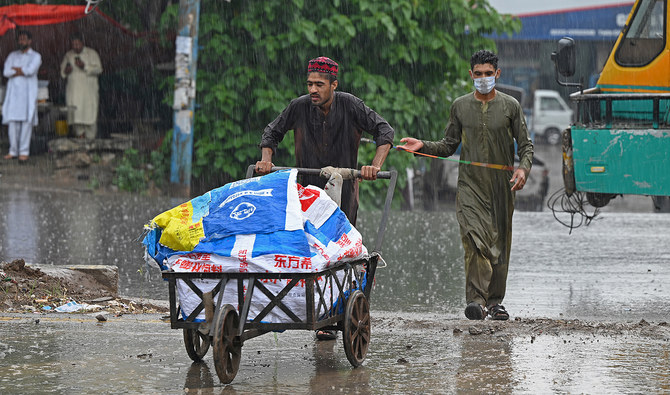ISLAMABAD: Pakistani Prime Minister Shehbaz Sharif on Monday directed federal and provincial authorities to be on high alert and utilize all resources to aid citizens as the Met Office forecast heavy rains and thunderstorms from April 26 and through the first week of May.
Record monsoon rains and melting glaciers last September displaced some 8 million people and killed at least 1,700 in a catastrophe blamed on climate change.
On Sunday, officials in the southwestern Balochistan province said at least eight people had died and over a dozen were injured after torrential rains followed by hail storms hit different parts of the province in the last 24 hours.
“Federal institutions should work in cooperation with provincial governments and departments,” the PM was quoted as saying in a statement released after he met senior disaster management officials. “Where necessary, to provide for the protection and assistance of the public. Wherever necessary, people should be shifted to safe areas immediately.”
Sharif directed the National Highway Authority and other relevant institutions to monitor inter-provincial national highways and ordered “effective arrangements for traffic flow and public convenience” on the Quetta-Karachi highway in Lasbela and Quetta-Sabi highway in Bolan.
“People should be alerted in various highways and affected areas. Protection of life and property of the people is the first priority,” the statement said. “All civic services departments should be alert in the rainy situation, work with national spirit and sense of responsibility. The people are also requested to take precautionary measures in the situation of severe weather and cooperate with the government institutions.”
The UN has urged international financial institutions like the World Bank and top leaders to reform policies that govern debt relief and concessional loan decisions so as to help middle-income countries like Pakistan focus on rebuilding rather than repayment.
Agreement at the COP27 climate talks last year to set up a “loss and damage” fund marked a milestone in the long fight to get help for poor communities on the frontlines of global warming. The two-week talks in the Egyptian resort town of Sharm el-Sheikh in November ended with a deal to establish a new fund to help vulnerable countries pay their rising costs of climate damage from wilder weather and rising seas.
A group of 134 African, Asian and Latin American states and small island nations, led by flood-battered Pakistan, presented a united front to push through the controversial fund.
















